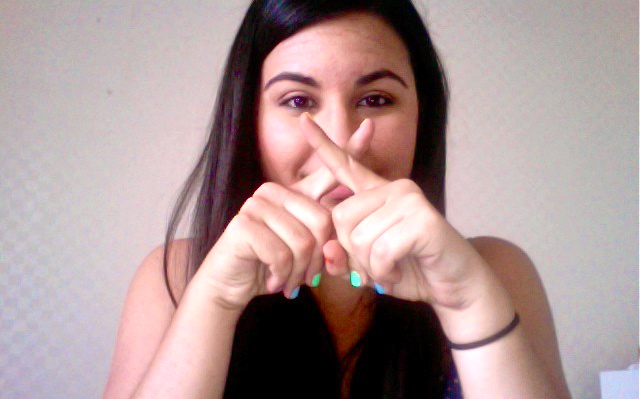It’s inevitable that when you live somewhere long enough you’ll begin to pick up some local habits, whether intentional or not. I like to think of these as expat souvenirs. Little things you bring back with you. Expat souvenirs could be the way people line up, hand over a credit card, or walk down the street. Maybe if you’re lucky you start drinking wine with lunch. Or if you’re not, you go back home looking like a rude weirdo without a firm grasp in the English language.
I, unfortunately, seem to fall into this latter camp. Here are some of the expat souvenirs I’ll be bringing with me when my two year stint on this peninsula is finished.
An X for no.
As someone with basically no knowledge of Korean (something which I am a little ashamed about), I rely heavily on hand gestures. The most common hand gesture in Korea is an ‘X’ made by crossing either the fingers or arms. Watch a few minutes of a Korean drama or look closely at the choreography of a K-pop dance and you’ll most likely catch a glimpse of this ubiquitous signal.
I quickly picked this up when I was teaching six year olds last year.
“Should we say ‘me is’?”
Answering my own question, “NO!” Accompanied with a very large and obvious arm X.
(I broke that habit in about a week. I like to attribute it to the overuse of the X.)
This soon spilled over into my personal life, especially after I shopkeepers and restaurant owners would answer my questions that way. Now I cannot control it, and if I’m giving someone a negative answer, arms or fingers are probably going to be crossed.
An inability answer yes or no questions correctly.
Speaking about answering questions, I can no longer respond in an appropriate English speaking manner. In Korean, the word for yes (예/네 or yeh/neh, depending on degree of politeness) expresses agreement. For example, in English if someone said to you, “You don’t like this movie?”, you would respond “No, I don’t like this movie.” But in Korean the correct response would be, “Yes, I don’t like this movie.” Because their statement was in fact true.
Sound confusing?
It was at first. Especially to my students who would ask things like “We don’t have a test today?” And then I would say “no” and they would start freaking out, thinking I was disagreeing with their statement, and complaining I never told them about this nonexistent test.
After a lot of confusion I started answering in the Korean manner (try explaining the difference of the word yes to a six year old, it’s easier to just change). Now it actually makes more sense to me and I end up answering the Korean way in English, much to the confusion (and probably annoyance) of others.
Pushing. All the time.
During my first weekend in Seoul I was riding the subway with a friend who had arrived about a month before me. It was incredibly crowded and as we approached our stop, worrying I wouldn’t be able to get to the door in time, I asked her how to say excuse me in Korean.
Her response?
You don’t.
After pushing my way through many a crowd over the past 15 months I can report that this is the truth. You will rarely hear someone in Korea say anything when they need to push by. They just go.
Following suit, and taking advantage of any opportunity where I don’t have to speak, I now just push through crowds. Nary an “excuse me” in sight.
The head bow.
As in most Asian countries, it is customary in Korea to bow to people to show respect. While it’s not necessary to do a full 90 degree bow at the waist every time you leave a convenience store, a little nod of the head is common. At school the security men head bow to me in the morning, and being the kind of respectful younger person I am, I bow in return. I bow when I take my credit card back from the woman ringing me up at the grocery store. I head bow when I get out of a taxi.
A couple weeks ago after dancing with a (white American) man at a bar, I bowed to him. Awkward.
In addition to the things I’ve already mentioned in this post, I no longer say “Bless you” when someone sneezes or “I’m sorry” when I run into a stranger. My natural instinct is to say thank you in Korean and I’ve lost the ability to make small talk with people in stores or restaurants. I’ve picked up some horrible Konglish phrasing from my students which makes my spoken English sound horrifying. They may not take up a lot of space in a suitcase, but these souvenirs are going to create a lot of baggage.
What are some of your expat souvenirs? Do you find them annoying or endearing? Leave your favorites in the comments.
If you haven’t already, please ‘Like’ Farsickness on Facebook and stay up to date on all my travels and posts! Your support is greatly appreciated.




Great post about Korean culture. I found that in London I say ‘do you know what I mean?’ and ‘are you right?’ instead of ‘how are you?’. I stopped saying the very Australian ‘how’s it goin?’ awhile back and I’m constantly apologising. Sorry! I like that being an expat means that you adopt the local lingo and mannerisms…
Natasha recently posted..5 Things I Learnt About Galician Culture in Galicia, Spain
Thank you! It’s interesting to see how people have changed from different cultures. Especially in English speaking countries that we often assume are very similar due to common language. There are still nuances that are picked up.
I also do the arm-X for no, the head bow to all and sundry, and the pushing without saying “excuse me”. I’ve also picked up the long, drawn-out, up-and-down “Aaahhh” Koreans make to express understanding. I did it whe I was at home with my family – they looked at me like I’d lost my mind! I also had an amusing incident where I bowed at the guy at the tyre shop when he gave me back my credit card – he was just like “wtf?!” Good times Korea ^^ (Oh yes, I make smiley faces like that too!)
A lot of things I do because of Korea make people look at me like I’m crazy^^ And I can’t believe I forgot about excessive, unnecessary, and often strange punctuation habits~~~~~~ Love the tilde. Thanks for the comment!
I just know the arm X is going to hang around for a while. And the head bowing. During my vacation to Malaysia I didn’t say excuse me and the other person stopped and said excuse me really loudly… I was like… oh right! Manners. Oh well.
Rachel recently posted..Seafood Paradise: Noryangjin Fish Market
Haha I love this! I do almost all of these things too. Another one is taking and handing things with two hands. I went back to Seattle for a wedding and my friends said I kept doing that. I’m also kind of terrified I might forget and call out to the waiters at restaurants once I’m back home!
I agree, that is a really hard habit to break! I almost yelled out one time when I was home in December but luckily realized before I did it that it would probably result in the server spitting in my food…
This is such a great post! I feel like I’ve picked up a bunch of Mexicanisms and might do a post on it too – Will totally give you the credit for the idea.
I feel like I’ve picked up a bunch of Mexicanisms and might do a post on it too – Will totally give you the credit for the idea. 

Ceri recently posted..Scenes from the Museo de Arte Moderno
It’s impossible not to when you’re in another country for a long period of time!